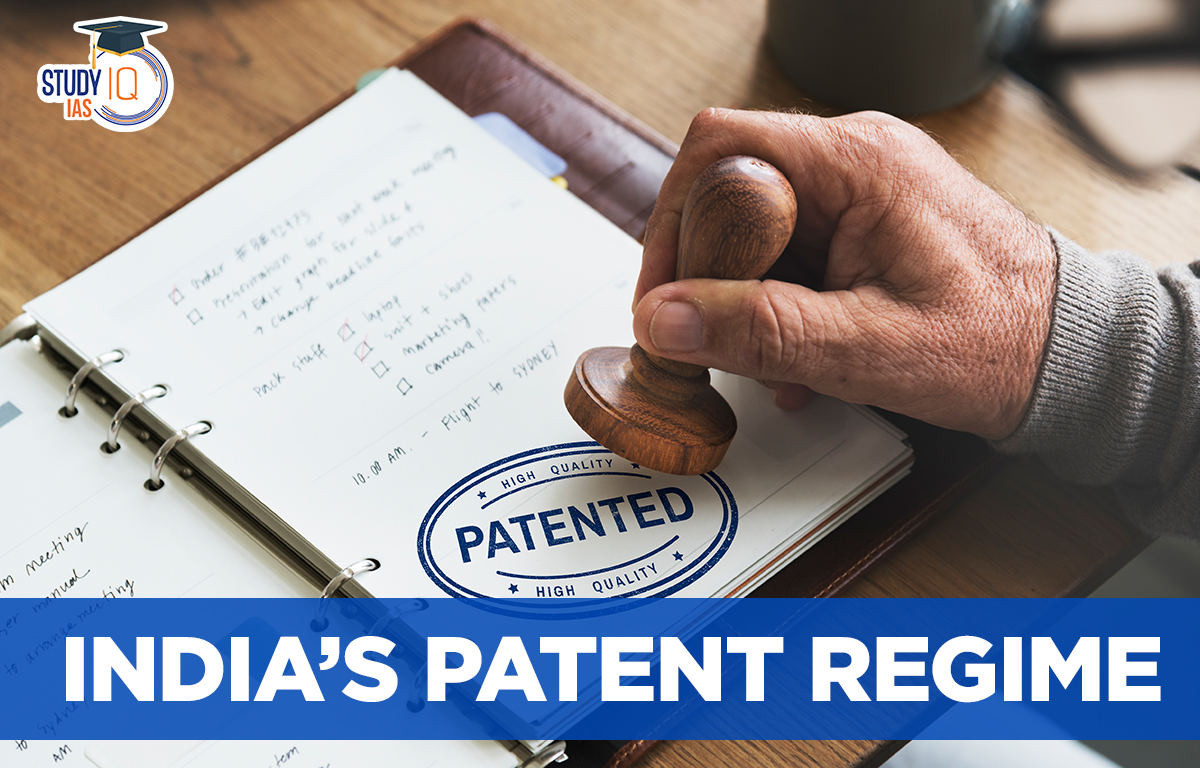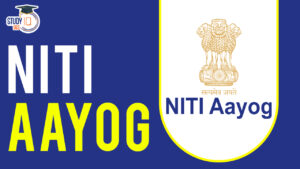Table of Contents
Context: The government is making plans to revamp functioning of patent office.
What is a Patent?
- A patent is an exclusive set of rights provided for an invention, which may either be a product or process that provides a new way of doing something or offers a new technical solution to a problem.
- Patent in India has validity of twenty years from the date of filing the application, irrespective of whether it contains provisional or complete specification.
- Under the the Indian Patent Act of 1970, patents are granted if following conditions are fulfilled:
- It must be novel
- It must have inventive step/s or it must be non-obvious
- It must be capable of Industrial application
- It must not attract the provisions of sections 3 and 4 of the Patents Act 1970

TRIPS Agreement
- Trade-Related Aspects of Intellectual Property Rights (TRIPS) is an international legal agreement between the member nations WTO that establishes minimum standards for the regulation of different forms of intellectual property (IP).
- TRIPS was negotiated at the end of the Uruguay Round of the General Agreement on Tariffs and Trade (GATT) between 1989 and 1990.
- Apart from granting IP rights, TRIPS also enforces remedies, and dispute resolution procedures.
Evolution of patent regime in India
- India has taken steps to align its IPR law with that of international regime. India joined Trade-Related Aspects of Intellectual Property Rights (TRIPS) Agreement following its membership to the World Trade Organization in 1995.
- Internal patent laws have been amended in India to comply with TRIPS, most notable being the introduction of pharmaceutical product patents into the legislation.
- India is party to various IPR conventions, including:
- Berne convention: Adopted in 1886, the treaty deals with the protection of works and the rights of their authors. Creators such as authors, poets, painters, musicians etc. are given the right to control how their works are used, by whom, and on what terms.
- Budapest Treaty: Budapest Treaty, adopted in 1997, concerns the international patent process for microorganisms.
- Parties to the treaty are obliged to recognize deposited microorganisms as a part of the patent procedure, irrespective of location of depository.
- Paris Convention for the Protection of Industrial Property: Adopted in 1883, it applies to industrial property in the widest sense, including patents, trademarks, utility models, industrial designs, service marks, geographical indications trade names and the repression of unfair competition.
- Patent Cooperation Treaty (PCT): The treaty enables to seek patent protection for an invention simultaneously across countries by filing an “international” patent application.
- Any person who is a national or resident of a PCT Contracting State, has the right to file the application.
- Doha declaration: Doha declaration on the TRIPS Agreement and Public Health was adopted in 2021, by the WTO member states.
- It says that TRIPS agreement should not prevent members from taking measures to protect public health, especially by promoting access to medicines for all.
- Countries should be given flexibility in terms of right to grant compulsory licenses and the grounds for such licenses, determining what constitutes public health crisis and the right to establish its own regime for the exhaustion of intellectual property rights.
Importance of Patents
- Protecting rights of innovators: Innovators will be assured that their products and innovations are protected from misuse, and they will get benefits of their hard work.
- Motivates innovation: Innovators will be motivated to put efforts towards research and development of new products. They will be assured that their innovation will bring them benefits.
- Boost to economy: Growth in patents enhances economic growth, creates new jobs and industries, and improves the quality of life.
- Facilitates transfer of technology: Patent protects the rights of foreign entities transferring their technology to Indian entities. Their innovations will not be misused due to IPR.
Challenges to Patent Regime in India
- Evergreening: Under Section 3(d) of the Indian Patent Act 1970 (as amended in 2005), patents are not given to inventions involving new forms of a known substance unless it significantly differs with regard to efficacy.
- This issue has been a concern especially for pharma industry, which usually rely on evergreening of patents.
- Compulsorily licensing: The government has powers to direct use, manufacture, and import or sell a patented invention without the patent-owner’s consent.
- Foreign investors bringing new technology are concerned that compulsorily licensing is misused to replicate their products.
- Enforcing rules: India’s laws on patents are very weak and violators are not stringently punished. This has put questions on the ability of the government to protect intellectual property.
- Judicial delays: Jurisdictional challenges and lack of expertise are reducing courts’ effectiveness in ruling on cases concerning patent laws.
- Narrow patentability criteria: The criteria for providing patents are very narrow, leading to exclusion of many patentable products from laws.
- Protecting traditional knowledge: The government has to ensure that traditional and cultural knowledge is not converted into intellectual property.
Way Forward
- Innovative ecosystem: Curriculum in school needs to be rebooted. Innovations have to be actively promoted in schools and colleges.
- This will in turn encourage newer generation to undertake career in research, boosting innovation in the country.
- Address gaps in laws: India’s laws on intellectual property have to be modeled on laws of the developed countries so as to address existing flaws. Certain issues like compulsorily licensing needs to be used in extraordinary circumstances.
- Expediting process of granting patents: Measures are needed to expedite the processing of patent and trademark applications. Additional manpower has to be utilized for this process.
- Industry-academia participation: Industry and academia must come together to boost research and innovation, primarily in the pharmaceutical sector.
- Intellectual Property Appellate Board (IPAB): There is a need to re-establish IPAB and empower it with more structural autonomy, infrastructural, and administrative reforms.
Patent laws in India
Indian Patent Act, 1970:
- The Patents Act, 1970 governs patents in India. The Office of the Controller General of Patents, Designs and Trade Marks is the body responsible for regulating the Indian Patent Act.
- This act was amended through the Patents (Amendment) Act, 2005, wherein patent for a product was extended to all fields of technology including food, drugs, chemicals and microorganisms.
Patents (Amendment) Rules, 2021:
- The law reduced patent fees for educational institutes by 80%. These rules will thus apply to all educational institutes and not just government institutes.
- The facility of expedited examination for patents has been extended to eight more categories, including female applicants, SME (Small and Medium Enterprises), government company etc.
World Intellectual Property Organisation (WIPO):
- WIPO is a UN specialized agency established in 1967 to promote intellectual property (IP) protection and encourage creative activity all over the world.
- Objective: Development of a balanced and accessible international Intellectual Property (IP) system that rewards creativity, stimulates innovation and contributes to economic development while safeguarding the public interest.
- Functions: WIPO hosts forums to discuss and shape international IP policies, provide services that register and protect IP in different countries, resolve transboundary IP disputes, help connect IP systems through uniform standards and infrastructure, and serves as a general reference database on all IP matters.
- WIPO also administers 26 international treaties that concern a wide variety of intellectual property issues.


 Jharkhand High Court Admit Card Out at j...
Jharkhand High Court Admit Card Out at j...
 Allahabad High Court Result 2025 Out at ...
Allahabad High Court Result 2025 Out at ...
 NITI Aayog Report on India’s Hand and ...
NITI Aayog Report on India’s Hand and ...





















